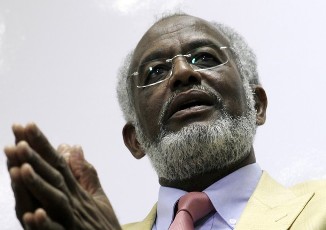Karti warns US against aid in war zones, threatens “security cards” against South Sudanese
February 3, 2012 (KHARTOUM) – The Sudanese foreign minister, Ali Karti, has challenged the United States to carry out unilateral delivery of aid in his country’s war-hit states of South Kordofan and Blue Nile, warning that Khartoum will not allow food to reach the rebels.

It was reported last month that the US is considering unilateral intervention to deliver aid in SPLMN controlled areas, where food insecurity and malnutrition have reached “alarming” levels, according to the UN’s top humanitarian official, Valery Amos.
Sudan’s foreign minister Ali Karti, speaking in an interview with Sudan state radio on Friday, warned that his country would not allow any humanitarian intervention without government consent, casting doubts on Washington’s motives and accusing it of seeking to feed the rebels.
According to Sudan’s top diplomat, the true intention behind calls for humanitarian intervention in the two states is to deliver aid to the rebels.
He further accused Washington of falling under the sway of lobby groups and said he had challenged a senior US diplomat to go ahead.
“We will not allow food to reach the rebels and those talking about forcible intervention are US lobby groups,” Karti told the radio.
He further revealed that he met the US Under Secretary of State for Political Affairs, William Joseph Burns, in the Ethiopian capital Addis Ababa and told him: “We will see if you can bring in food by force, and we will not allow food to be brought to the rebels.”
Karti’s remarks come a few weeks after Khartoum appeared to have diluted its stance regarding the presence of aid groups in the two states.
Sudan announced in late January that aid groups already existing in South Kordofan and Blue Nile will be allowed to work on a set of conditions including restrictions on movement of their staff, and that the distribution of their aid will be handled by local organisations.
Aid has always been highly politicised in Sudan’s conflicts.
The violence in South Kordofan and Blue Nile has already forced about 417,000 people to flee their homes, more than 80,000 of them to South Sudan, the United Nations estimates. Locals have faced air raids and sporadic ground fighting, according to human rights groups and refugees.
The Sudanese minister grew more scathing as he derided the US as a weak state whose politics is influenced by activists.
“It is laughable that [US] politicians are influenced by activists and organisations,” he said.
He went on to claim that the former US President Gorge Bush had phoned Sudan’s President Omer Al-Bashir and stated that we [Americans] “let you down when you signed the [2005 Comprehensive] Peace Agreement [with South Sudan] and we did not keep our promise to remove Sudan from the list of countries sponsoring terrorism and lift economic sanctions.”
Sudanese officials don’t hide their frustration with what they see as Washington’s failure to deliver on its promises, namely removal of Sudan’s name from the terrorism blacklist and lifting of economic sanctions which have been imposed on Khartoum since 1997.
Last year Washington exempted South Sudan, which seceded from Sudan in line with the CPA in July last year, from the economic sanctions imposed on Khartoum, and later said that the new state is allowed to receive US weapons.
Karti threatens to use “security cards” against South Sudan
Turning to Sudan’s frayed relations with South Sudan, Karti warned that Khartoum could easily destabilise the new state if it wanted to.
“If we just think about it, the options before us are countless,” he said.
The already tense relations between Khartoum and Juba plummeted further last month as the recently separated countries failed to agree on a charge for transporting oil of land-locked South Sudan through Sudanese territories to export terminals on the Red Sea.
As the talks over transit fees continued to flounder, Sudan moved to confiscate southern oil, prompting Juba to accuse it of “stealing” and halt oil production all together.
“We have many cards to use against the south, and the southern government has consumed all its cards. We are yet to use any of the security cards and it is high time that the [Sudanese] government considers this option,” Karti said, adding that it is time for Khartoum to move to “plan B.”
After April the 700,000 South Sudanese estimated to be remaining in North Sudan will be treated as foreigners, Khartoum has said. South Sudan, however, has said that any North Sudanese living in the new country is able to take southern citizenship.
Sudan and South Sudan routinely trade accusations of supporting rebel groups on each others’ territories. Khartoum says Juba is supporting SPLMN rebels, who fought as part of the southern army before independence, while Juba accuses Khartoum of supporting southern rebel groups.
Karti said that Juba’s decision to halt oil production is essentially an attempt to change the regime in Khartoum by strangling it economically, saying that such plan will not work.
“They are foolish to think that. The Sudanese government will not die,” he said.
(ST)
